ONE MONTH IN THE BASQUE COUNTRY

ESPAÑOL
EL PUENTE NUEVO: UN VISTAZO
DEUTSCH


































HERMANN HESSE
UND SEINE BÜCHER
PORTUGUÊSE CHINESE 汉语 CULTURE
ONLINE IDIOMS JOGO OLÍMIPICOS E PARAL MPICOS UOB’S ONLY LANGUAGES MAGAZINE
Issue 9
FEATUREDARTICLES













TRAIL RIDING IN ALMERIA
Want to know what it’s like to horse ride through the rural Spanish mountains in locations used in Wild West films?

PAGE 6
EDITOR’S NOTE
by Maddie Kilminster
A TRIP BEHIND THE TIN FOIL CURTAIN
One writer’s first trip into Russia and what he didn’t expect!


PAGE 16
A warm welcome to all readers! We are The UoB Linguist magazine, founded and written by students for students about everything international. We pride ourselves on providing the only opportunity on campus for students to write in foreign languages. Dip in and you will find sections in Spanish and German all the way to Japanese. Anyone can write for us, even if you don’t study languages. No matter what your interests we’d love to read about your fascinating travel anecdotes and views onforeignaffairs,cultureand style. If you’re planning a year abroad – we’ve got lots of tips from the horse’s mouthtohelpyouout.
We’re a society in the Guild as well which means you can join up and write, edit, and come to our socials for the
whole year! We’re a great mix of people all united in their passion for foreign culture. In 2013 we won the award for ‘Most Outstanding Society’. We publish issues twice termly and also run a website: (www.theuoblinguist.co.uk) which allows a constant stream of your articles to go up. It’s a real kick to see your name in print and a great assettoputonyourCV.
This new term we have elected a dynamic, creative and enthusiastic team of editors and writers who have put loads of energy into this first issue. Make sure you especially check out: “European Literature: Lost Without Translation” and “Marion Cotillard—UneStarDiscrète”.
Hope you enjoy reading, maybe you’ll even pick up a few new phrases by the end and maybe even get involved yourself! Release the journalistwithin!

November
2014
PAGE 3: CURRENT AFFAIRS
PAGE 5: LIFE & STYLE
PAGE 6: TRAVEL
PAGE 7: FOOD & DRINK

PAGE 9: CULTURE
PAGE 12: ESPAÑOL
PAGE 13: FRANÇAIS
PAGE 14: PORTUGUÊS
PAGE 15: DEUTSCH



































































PAGE 16: РУССКИЙ
PAGE 17: ITALIANO
PAGE 19: POLSKI
PAGE 20: ΕΛΛΗΝΙΚΑ
PAGE 21: CHINESE 汉语
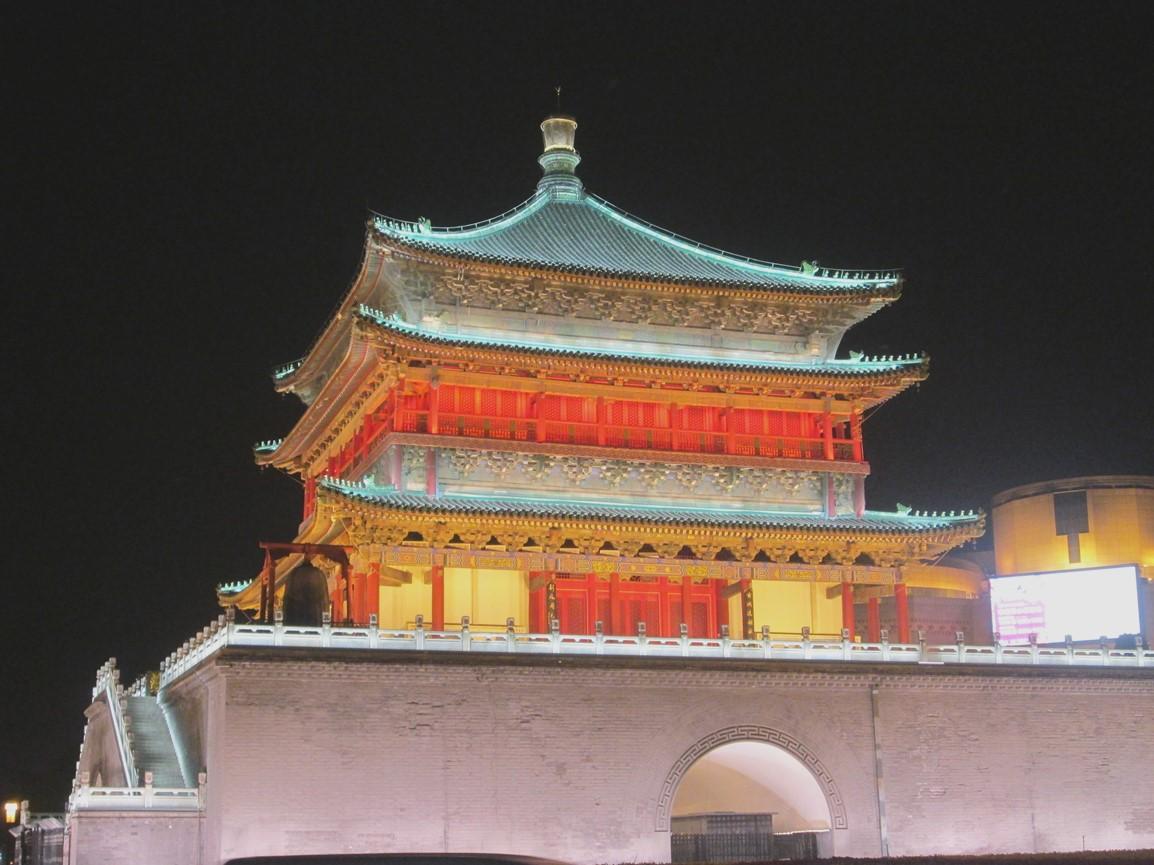
PAGE 22: JAPANESE 日本語
If you would like to know more about our magazine, our writers or have comments to make about our articles then feel free to check out our Facebook and Twitter pages or email us. If you wish to read more articles check out our website. We’re always looking for new writers and contributors, so don’t hesitate to get in touch!

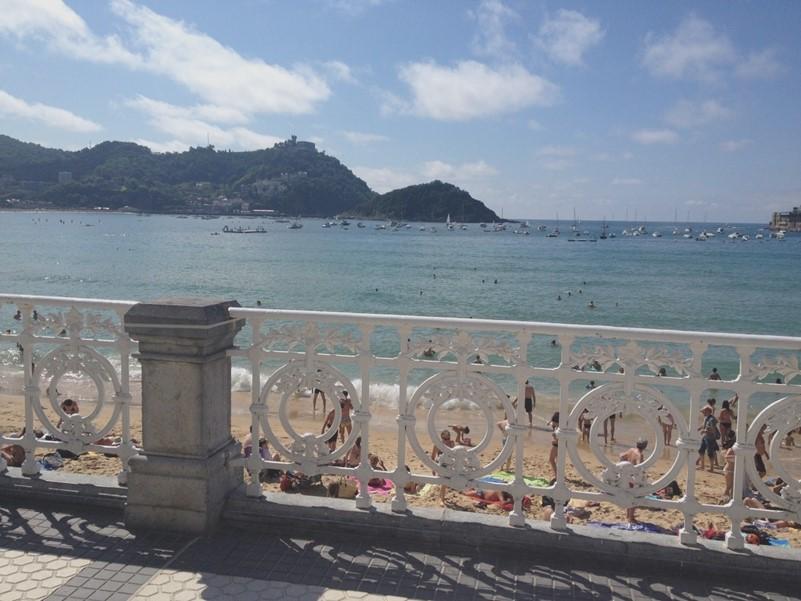
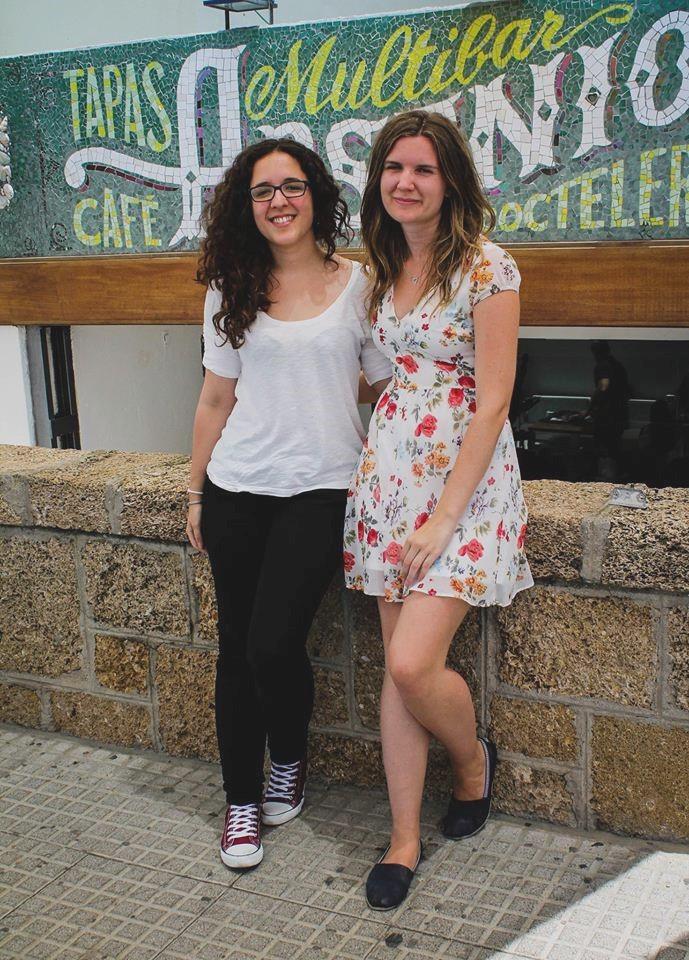
linguist@guild.bham.co.uk


IN THIS ISSUE 7 21 20 CONTACT US THEUOBLINGUIST.CO.UK UoBLinguist_Mag The UoB Linguist Magazine UOBLINGUISTMAGAZINE
Front Cover: Photograph taken in San Marino by Natalia Alyukova
CURRENT AFFAIRS
MEXICO’S MISSING STUDENTS
 by Lucie
by Lucie
P.









 Norris
Norris
In Mexico, on 26th September, students from a school close to Chilpancingo, the capital of the state of Guerrero, were brutally attacked as they were travelling back to Ayotzinapa, where they study.
They had been spending the day in Iguala raising money for a campaign against the government’s new laws on education. While there, they had a rather violent encounter with the police force and they retreated to the bus station, from where they boarded the buses back to the Ayotzinapa training college. It was then that the buses were caught under fire.
Six people died immediately from the shooting, while a further 43 students were violently abducted by their attackers. The missing students, young men from quite deprived areas, were studying to become teachers and have not been seen since.
The college they currently study at is known for being left-wing, so some are wondering if their political beliefs could be the reason for the attack. Indeed, according to one left-wing website, Socialist Worker, the school is referred to by the government as ‘a breeding ground for guerrillas’. Moreover, several former students became infamous radical leaders or guerrilla fighters in Mexico.
Another theory is that the attack was the retaliation of the Guerreros Unidos gang, after the students’ refusal to give into the gang’s extortion. The Guerrero state is known for its gang- and drug-related violence, so much so that several governments, including France, Belgium and the UK, discourage travellers from visiting this Mexican state, as well as several others.
During the investigation that followed, it was discovered that some of the shooters were policemen, working for the Guerreros Unidos drug gang. 22 police officers were then arrested and will remain in custody during the investigation. As a result of the police force’s connection to the attack, President Enrique Peña Nieto has replaced the town’s entire police force with federal agents.
The mayor of Iguala, who is under suspicion for his involvement in the case, fled the town along with his wife and head of security immediately following the events and is reported to be a fugitive. The general public all over the country has responded to the shooting with great indignation and horror. Soon enough, there were protests occurring throughout the state. Some were showing their support to the students and their families, while others were crying out for the government to investigate faster.
This horror and dread was exacerbated by the discovery of mass graves containing human remains and burned bodies, in a place where the cartel is suspected to bury its victims. Investigators are still trying to determine the identity of these victims.
However, the missing students' families, who arrived in Iguala in the days following the shooting, are trying to remain hopeful that their children are still alive. They are carrying on the investigations themselves, knocking on every door of the town to try and locate their loved ones and gather information. Some of them blame the government for waiting more than a week before launching a serious investigation.
The latest news regarding the case is the death of Benjamin “El Benjamon” Mondragon, one of the leaders of the Guerreros Unidos gang, who shot himself dead during a police raid. A government spokesperson has said that Mondragon preferred committing suicide to surrendering to the police. Whether his gang is responsible for the killing and abduction of the students is still yet to be proved.
Another leader of the Guerreros Unidos gang, Sidronio Casarrubias, was arrested in the days following the death of Mondragon. Mexican authorities hope to link him and his gang to the shooting and abductions. The main concern today is to find the missing students, hopefully safe and sound.
GUILD OF STUDENTS ‘OUTSTANDING SOCIETY 2013’! 3
THE GENERAL PUBLIC ALL OVER THE COUNTRY HAS RESPONDED WITH GREAT INDIGNATION AND HORROR
CREDIT: REUTERS/JORGE DAN LOPEZ
THE ACT OF PROTESTATION: HONG KONG
Hong Kong has become one of the spotlights of the World News section lately. In case you are confused by the flood of information, this is essentially what happened: thousands of people staged a huge civil disobedience movement, ‘Occupy Central’, in Hong Kong, after the Chinese government broke its promise to grant Hong Kong universal suffrage by 2017. ‘Occupy Central’ started off as a student strike initially, but as the Hong Kong government sent its riot squad to feed the students with tear gas, pepper spray, and violence, the strike escalated into a mass movement where protesters gathered together to paralyse prime parts of Hong Kong.
A BBC reporter, Samanthi Dissanayake, once wrote that she was surprised to see how peaceful the protesters were, and the newspaper The Independent praised Hong Kong’s protesters as ‘the most polite protesters ever’. Having gained access to lots of first- and second-hand information, I have found several examples to support these views, so I have compiled my own list of facts about the conduct of the protesters throughout the events that I believe to be remarkable:
by Jessie Fok
The protesters cleaned up the streets and collected recyclable waste after their confrontation with police;
They shared umbrellas with their oppressors, the police, when it rained;
They shared resources like food with each other;
An open 'study room' was built with protest materials, where students studied quietly when demonstrations were not happening;
The protesters turned themselves into 'a public choir’, singing songs as they sat peacefully, and waving their lit-up phones in the air like a sea of fireflies;
They protected each other’s property - when two HK$100 notes were found on floor, they left them there and added a note asking whose money it was. Nobody stole the money.
As a main international metropolis of Asia, Hong Kong’s peoples’ creativity and smartness have always been complimented by others. Yet lately, this Pearl of Orient was also called a ‘Cultural Desert’ due to the city’s excessive commercial atmosphere. Fortunately, the ‘Occupy Central’ crowd has shown everyone that Hong Kong people are as innovative and hot-blooded as ever:
HOW FAR WOULD YOU GO TO FIGHT FOR IMPROVEMENT IN YOUR HOME?
Provisional bathrooms were built with scrap materials near ditches on streets; Inspired by the protest, numerous works of art, including songs, pictures, and literature, have been created;
Juice sellers turned their shops into hawker’s handcarts in order to boost the sales of their business;
Some protesters volunteered as private teachers, making sure the protest would not affect the study of the younger ones;
Tablets for Guan Yu - a legendary Chinese general that is now thought to bless fighters – were set up by protesters to discourage the police from suppressing them violently;











Toilets were filled with all sorts of commodities - from toothbrushes to shaving products and sanitary products. They were donated to protesters by other democrats.
Not only is the ‘Occupy Central’ protest peaceful most of the time, all the happenings also reflect that Hong Kong protesters are of a high quality. As an international student from Hong Kong, though I am not an eye-witness to the protest, I am very proud to be one of the city. The question I put to you is this: how far would you go to fight for improvement in your home country?
4
THEUOBLINGUIST.CO.UK
Tablets for Guan Yu : a legendary Chinese general that is thought to bless fighters. They were set up by protesters to discourage the police from suppressing them violently
LIFE & STYLE
THE FINAL COUNTDOWN by









 Daisy Lindlar
Daisy Lindlar
I’m currently going through a phase that I’m sure many final year university students before me have gone through: the quarter-life crisis. This mainly entails moments of panic over where my life is going, the sheer volume of work that’s expected of me, and the fact that soon I’ll be leaving the Selly Oak bubble to make my way in the big wide world.
University students of today are under so many pressures: work towards at least a 2:1 in your studies, get on a grad scheme, juggle society commitments, all whilst keeping up your social life so as to avoid becoming the next UoB Library Hermit. We’re only at the start of term and I’ve already found myself wishing for Hermione Granger’s Time-Turner, just to make everything a bit more manageable.
All this said, it’s easy to find final year a little bit overwhelming. So, I’ve compiled a list of tips on how to deal with the pressure of your final year – or any academic year for that matter – from recent graduates who have been there and done that.
Find out how you like to work, and then do that! Some people do their best studying in the morning, others like to do things last minute, and so on. There is no right or wrong way to study, so learn how you do it most effectively, and then take advantage of that.
Schedule your days. If you’ve only got six hours of class per week, it’s easy to spend a lot of time procrastinating. Make yourself a timetable and include time spent reading, working on essays, writing up notes, and so on. Not wasting time in the week also means you can reward yourself with free time in the evenings and a proper weekend!
Try not to lose perspective. You’ve been building up to final year for a long time, and there are going to be days where it feels like the most important thing in the world but it’s not. See the bigger picture, and bear in mind that in five years you won’t remember that frustrating time you got 59% on an essay.
Don’t forget your friends. You’re all in the same boat, and any worries that you’re having, they’re probably having too. Support your friends, let them help you out, and you’ll get through final year together – before having one hell of a celebration.
Take time out for yourself. Just because you have a lot of work to do, doesn’t mean that it’s all you should be doing. It’s important to make time to relax and get your mind off essays and exams, for the sake of your physical and mental wellbeing.
Continue your life as it was in first/second/third year. Obviously you will be really busy with your studies in final year, but keep doing societies or sports, and most importantly, keep having fun. University is about much more than just your degree, so don’t forget about all the other bits that make your life here great.
Embrace the good times and the bad. Every year is full of ups and downs, and even more so for your final year of university. However, view each negative experience as an opportunity to learn, and you’ll turn it into a positive. A winwin situation!
Finally, and maybe most importantly of all, make the most of it. You only have a few short months left of student life, so try to enjoy every minute; before you know it, you’ll be wishing you could do it all over again.
GUILD OF STUDENTS ‘OUTSTANDING SOCIETY 2013’! 5
UNIVERSITY IS ABOUT MUCH MORE THAN JUST YOUR DEGREE
TRAVEL
by David Clarke
This summer I spent six weeks in China travelling and teaching English. If you are considering visiting China, the first thing you need to know is that it very different from the UK; the food is different, the language is different, the buildings are different, and the people are different.
My first stop was Ningxia, a province in the north. Ningxia does not have many foreigners, so I stuck out like a sore thumb but it was fortunate that the locals are particularly friendly to foreigners. They often took my picture and bought me drinks so for the first few days I felt a bit like a celebrity. Even so, the novelty soon wore off. Despite the fact that Ningxia is a province which is small and relatively unheard of, I grew somewhat attached to it. The highlight of my time there had to be flying across the Yellow River on a zip wire. I also travelled to Qinghai Lake – the largest in China. I went horse riding around it, taking in the views. I also paid some guy 10 RMB (the equivalent of about £1) to sit on his yak.
Chinese food is very unique, but I soon grew to love it. Although eating everything with chopsticks takes some getting used to. My favourite type of meal was hot pot. In hot pot restaurants, every person at the table has their own mini hob. The waiters bring you the meat and vegetables uncooked and you boil them yourself in a spicy broth – very tasty indeed. Chinese alcohol on the other hand wasn’t great. The beer was weak and watery, but a lot cheaper than imported brands. There was one particular spirit called bijou which was absolutely lethal. I wouldn’t recommend that at pre-drinks!
I think people in the western world are relatively uneducated about China. We don’t learn about the vast Chinese history or Mandarin in School. I think it’s a shame considering China is home to almost 20% of the world’s population, and is one of the fastest growing economies in the world.








TRAIL RIDING IN ALMERIA
 by Sarah Dipchan
by Sarah Dipchan
Trail-riding in Almeria was a humbling experience. I realised very early into my holiday that there are no health and safety precautions in rural Spain; riding was simply a case of picking a horse out of the forty kept at the ranch, heading for the mountains and hoping for the best. As for the landscape, it was so alike the Wild West in appearance that it was the location of famous Western movies such as ‘The Good, the Bad and the Ugly’ and ‘A Fistful of Dollars’. For me, the possibility of slipping off the one-horse-wide trails which were thousands of feet high, (the fate of many a western rival in the movies) seemed to be a danger very close at hand.
Not possible to climb by foot, the horse must have been a lifeline to the many Spanish farmers of the past who had worn these trails into the mountain faces by riding them day after day to cultivate crops or to transport goods to the other side. While I chosen to ride hot-blooded horses for six hours a day only to marvel at the testing drops and steep climbs ahead of me, I realized that for the Spanish farmer and his horse, it was a chore, a responsibility, the only way to feed a family.
There is a depth to the partnership between man and his steed which must be felt to ever be truly understood. My favourite horse was a proud grey gelding. He was Spanish bred and pure white from head to tail, with constantly pricked ears and a haughty step. He was headstrong and fast, bred for outrunning bulls in some of Spain’s most questionable cultural activities. Older than me at the estimated age of 23, I couldn’t help wondering of the many things Buli had witnessed in his lifetime. The ranch owner, who had rescued all of her horses from different, but equally horrific conditions, pointed out the marks of cruelty that permanently scarred him. Just above his hooves were deep gashes that showed Buli had been hobbled.
Since the first time horses were ridden, the animals have been trained by humans in varying and sometimes damaging ways. But what my experience in Almeria taught me is that people should have learnt a hell of a lot more from horses. Loyalty, steadfastness and forgiveness combined with the ability to endure suffering are all innate traits possessed by every horse, but unfortunately by only a handful of men.
6 THEUOBLINGUIST.CO.UK
FOOD & DRINK










DIGBETH DINING CLUB: A REVIEW by Kirsten Peters Roebuck
Venture down to Digbeth at nightfall on any given Friday and you’ll be too late for a spot of shopping, and too early for the legendary nightlife, but you’ll be right in the thick of one of the most exciting culinary experiences Birmingham has to offer. Despite first opening its doors just two years ago, Digbeth Dining Club has quickly cemented itself as an institution for foodies and connoisseurs of independent culture alike.
As you round the corner onto Lower Trinity Street you may wonder whether you’re in the right place, but tucked away behind the excellent Old Crown and below the Duddeston Viaduct, the hustle and bustle of this popular event will soon become apparent. Harnessing the ever growing popularity of street food in the UK, Digbeth Dining Club brings together the best in local offerings every Friday night at Spot*Light. Depending on the week, you might find Spectacular Goat’s sourdough pizza ovens; Bournville Waffle Company’s retro caravan, or the Thai treats of Canoodle standing shoulder to shoulder with an assortment of other traders. Each one entices visitors over with their delicious wares. You can check on Twitter for each week’s line up of traders, or just turn up and be surprised! My personal highlight would be the rich lamb Durban curry from Savanna Grill, which is served in a hollowed out bread roll. Alternatively, my boyfriend couldn’t sing the praises of The Meat Shack’s Jam Pudding burger (featuring black pudding and bacon chilli jam) highly enough.
If you arrive early enough, you can grab a seat inside the artsy, atmospheric Spot*Light. The bar is in full swing all evening and the vibe is extremely friendly. Main dishes cost between £5-£8, and the choices are endless, so be sure to take a few friends to maximise the opportunities to taste test!
QUALITY SUSHI IS NOT ONLY FOUND IN JAPAN by Kristie Chan

Having always been a food lover, nothing can stop me from craving good quality food even if I am studying abroad in Birmingham, which is miles away from my hometown. (I was raised in Hong Kong where people call my country “the food paradise”.) I never thought that the UK would have a very high standard of Asian food; not until I found this Japanese Restaurant called Sushi Passion. Originally, their shop was located inside the Bullring Indoor Market, where you could see a bench of chairs with only five seats facing an open kitchen. It has now moved to a shop with much larger dimensions in the Great Western Arcade, near the Birmingham snow hill. They have redecorated the whole restaurant and now, you will find there a very ‘Japanese’ and cosy atmosphere. But of course, the decoration is not the main reason that I recommend this restaurant: the food should be the focus.
I love having a meal with a large group of people as we can try many different kinds of food and so every time I am craving sushi, I will ask my good friends to go to Sushi Passion with me. I would say that the ‘bridge of sushi’ is a must-order item without any hesitation. (see picture!) This ‘bridge’ is one of the sushi sets that you can find on the menu. It costs £44 which I think is a pretty fair price since it is quite expensive to buy fresh raw material, such as salmon and shrimp, when it comes to Japanese food. To talk about my favourite sushi; it must be the Salmon Teriyaki roll without a doubt. What I can tell you about the roll is that it has delicious ‘layers’. You will find it very crispy when you have the first bite, which is the fried onion pieces. And for the second bite, you will definitely be inspired by the freshness of the avocado. I have never had such a sweet and fresh avocado! The spicy salmon and Japanese dressing will also make you fall in love with it!
It is clear that you cannot only find quality sushi in Japan or other Asian countries. If you are craving for Japanese food, Sushi Passion would be a wise choice for you.
GUILD OF STUDENTS ‘OUTSTANDING SOCIETY 2013’! 7
CREDIT: BIANCA HARVEY PHOTOGRAPHY
WHAT CAN I GET FOR A GOLDEN GRAIN?


 by Floren Villanueva Scrafton
by Floren Villanueva Scrafton
Every weekend, especially on Saturdays, the “Wall Street of Quinoa” is seen spreading across the town of Challapata’s excessively wide streets. It offers a first-hand experience of the current market and economic status for the ‘newly’ arisen superfood quinoa. This grain-like ‘pseudo-cereal’ comes from the Andean highlands, and despite its new and exploding appearance across the Western world, quinoa has been a staple in the Bolivian diet for 5000 years, until however, more recently. Enthused by the situation revolving around quinoa and its benefits and dilemmas for the Bolivian population, I spent a month in Bolivia this summer researching the topic.
My visit to the Bolivian town Challapata provided me with an intriguing view of the ‘quinoa boom’. From a distance, the Challapata market appears like any other colourful, bustling, women-dominated Bolivian marketplace: full of food stalls from 6am until sell-out. However, despite Challapata lying at the heart of Bolivia’s key quinoa producing region, not one quinoa dish is served here. Neither are the characteristic, charismatic cries from market sellers heard by those passing by.

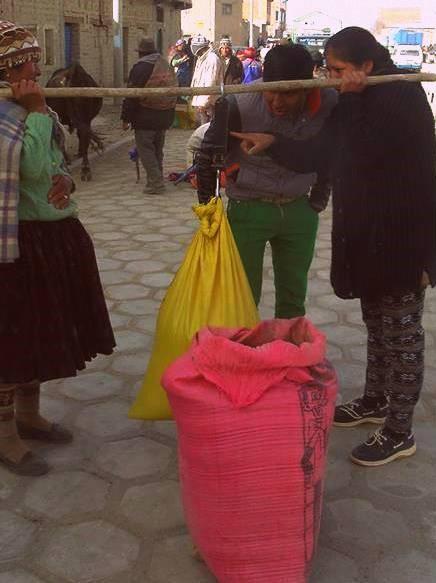
What is evident though, is a team of ‘quinoa police’ demanding IDs as proof of right of sale. The trade is strictly monitored by these ‘police’, drawn from ten different regulatory organizations. The atmosphere was curious and unlike any other market I have ever experienced. Apprehensively, I delved further to discover what all the fuss surrounding quinoa, aka ‘palm-gold’: rich pearls harvested from the earth once covered by water, was about.
The most striking impression was a clear obsession - even desperation - to handle the smooth, colourful, light-reflecting grains in one’s hands. Without asking, quinoa trader Estella Paire jabbed her hand into her sack of gold with an ore-extracting tool to channel a sample of the riches from her hands to mine. Then came the tricky part: she paused and cued me to move the grains around to verify their ‘premium’ physical properties. As a novice quinoa inspector, my quality check was far from thorough, and was limited to the grain’s colour and degree of roundness. The grain’s morphology is key: the ‘Real’ (‘royal’ in English) variety has near-spherical and large grains, boasting higher nutritive content than the more common “smaller and sweeter” varieties. Especially obvious is the higher saponin content of Quinoa Real, which is spread across the grain’s greater exterior surface area. This chemical is responsible for the ‘bitterness’ of the pre-washed grain, while also proving an invaluable product for future therapeutic and medicinal use, as current scientific investigation across the world is showing.
So how much money are we talking? Measured in ‘quintals’ which are equivalent to 100 lbs or 45 kg, one quintal of Quinoa Real has a value between 1,300 Bs – 1,900 Bs (£115 - £168) depending on current availability, i.e. after or before harvest season respectively. For comparison, Bolivia’s most premium rice costs a maximum of 390 Bs (£35). Bearing in mind that these are the raw market prices for large quantities, the gap grows even larger when buying commercialised quinoa and its many derivatives.
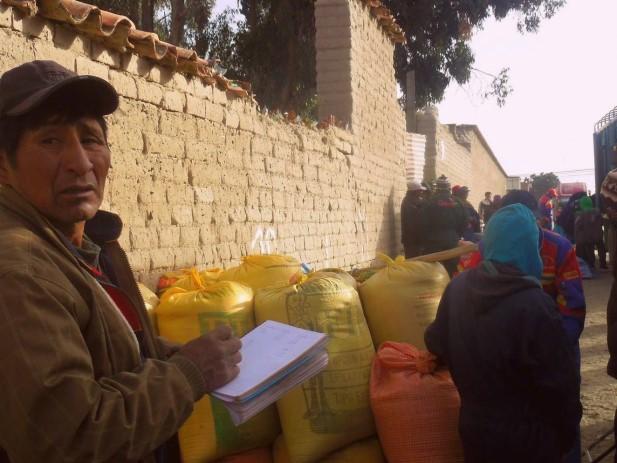
Does palm-gold have national gold mine potential? Absolutely. From the start of the ‘boom’ just before the millennium, quinoa export values rose in 10 years from $2m –$46m. Now, today, after the success of IYQ this total exceeds $80 m. However, despite the exploding rate of expansion this century, quinoa sales and exports currently only make up 1% of Bolivia’s GDP, making up 10% of the contribution of Bolivia’s agriculture industry as a whole.
These figures can only grow more positive, and rapidly so, if recent trends continue. As mechanisation and innovative cultivation techniques become established, further global promotion using the latest scientific knowledge will ensure that demand is at speed with supply. Bolivia’s Grano de Oro is not only a complete food, but is adaptable to different terrain and climates, promising security in the battle against climate change. Guillermo, is also convinced that quinoa as a food product, will be outshone by future development of its special chemicals, including saponins, which, as a medicinal and a more specifically nutritious tool, he predicts will have a market at least 100% more lucrative than quinoa itself. It’s as if, quite literally, the world is finally tapping into Bolivia’s ancient reserve of colourful, multi-purpose oil: Quinoa.
8 THEUOBLINGUIST.CO.UK
CULTURE
ONE MONTH IN THE BASQUE COUNTRY

I spent the month of June teaching English to 6-8 year olds in the little town of Andoain in the Basque Country in Spain. One month is the longest I’ve ever spent away from home before and it was a fantastic experience. I learnt many cultural lessons and I found out things about myself that I never knew before.
1)Basque hospitality is true hospitality.
Basque people are really friendly and hospitable. I was constantly told to ‘make myself at home’ or ‘take whatever I need’. The English pride themselves on being polite and we too will tell our guests ‘mi casa es tu casa.’ But I felt as if my Basque hosts were being truly sincere and not just following conventions of politesse. I honestly could have taken a big handful of whatever snack was available and no one would have batted an eyelid.
2)I like the rain.
This honestly shocked me. I always thought that rain was horrible and gloomy. Yet every time it rained during my stay (which was a lot!) I had an overwhelming feeling of being at home. It made me realize that the rain can be really quite comforting.
3)Basque women are very special.
I basically spent 31 days hanging around with a group of Basque mothers, so I got to know them very well. One night while we were sitting in a bar, I was suffering from my usual communicating-in-another-language nerves. I looked at them and was struck by the thought that none of them could ever have been the dithering and delicate little girl that I felt like. Strong and dark-haired with bigger-than-average calf muscles, they are direct and certainly don’t take any nonsense. But they’re not masculine or scary at all. They’re real women and they’re truly lovely.
4)Pintxopote














England needs to adopt this. Now. Pintxopote is the Thursday night bar-crawl. Everyone gets together at 7pm and goes off to a bar to have one ‘Pintxo’ (a small tapas) and one ‘Pote’ (A small glass of whatever drink you like) for a special, really cheap, Pintxopote price. Parents sit and socialise while their children play and after they finish in one bar, it’s onto the next! The eating goes on until 9pm but the drinking goes on as long as you like
5)Modorra
This word doesn’t really have a proper translation in English. Look it up in a dictionary and it will probably say drowsiness. But ‘Modorra’ is the particular lethargy that only comes when it’s hot- you’ve ate a big lunch, and are ready for your siesta.This one word encompasses several cultural differences. Here, it’s never hot enough to be tiring. We don’t eat much for lunch (Spanish people have ridiculously large lunches!) and we don’t really do siestas.
The fact that it doesn’t translate properly proves that Modorra is innately Spanish.
6)Travelling alone is refreshing.
During the weekends I would travel to a nearby city like San Sebastian or Pamplona and spend time exploring the area by myself. I thought that I would be lonely, but I felt so much freedom. The best thing about a solo adventure is that you can do whatever you feel like, whenever you want.
For the first time I could take as long as I liked in a shop, casually decide to stroll to the seafront, spontaneously stop at a bakery on the way and enjoy a delicious pastry while sitting on a beautiful pier. I enjoyed getting lost in my own thoughts, and I think that’s a really important lesson.
GUILD OF STUDENTS ‘OUTSTANDING SOCIETY 2013’! 9
THE BEST THING ABOUT A SOLO ADVENTURE IS THAT YOU CAN DO WHATEVER YOU FEEL LIKE, WHENEVER YOU WANT
EUROPEAN LITERATURE: LOST WITHOUT TRANSLATION
The winners of the 2014 European Union Prize for Literature (EUPL) were announced this October at the largest book fair in the world, the Frankfurter Buchmesse. 13 winners from 13 different countries were chosen as the most promising new authors in Europe, including the UK’s Evie Wyld. While the €5000 prize they each receive is not exactly staggering, the authors have the valuable opportunity to apply for EU funding to get their books translated.










The prize is funded by Creative Europe, a programme run by the European Commission that aims to promote literary translation across the continent. This encouragement certainly seems to be needed in the UK - according to Literature Across Frontiers, only 2.5% of all the books published in this country are translations. Compared to 12% in Germany, 15% in France and 24% in Spain, a huge imbalance in literary translation between the UK and the rest of Europe becomes clear.
by Jenny Nicholls
Some might say it is lack of public interest in foreign literature that means investing in translations isn’t worthwhile for mainstream UK publishers. Yet the current boom in popularity for Scandinavian crime fiction, the huge success of the recently translated children’s book The Letter for the King, and - looking outside of European translation - the persistency of Haruki Murakami’s name at the top of bestseller lists, suggests otherwise.
Perhaps the issue is instead a practical one. Two thirds of all European translations are from English. Rather than this being anything to do with the quality or quantity of English-language books, it is due to the general dominance of the language in the world. A high proportion of European editors have a good enough standard of English to be able to read English-language manuscripts, meaning that the chance for UK books to be considered for translation in any given country is much higher than for books from other countries. In the same vein, not so many editors in the UK are fluent in another language, and therefore manuscripts can only be presented to them after translation.
ONLY 2.5% OF ALL THE BOOKS
PUBLISHED IN THIS COUNTRY ARE TRANSLATIONS
But the language barrier is not the whole story. Take the winners of the EUPL: they have been handpicked as the best upcoming authors in Europe, their books have been laid out as potential bestsellers - and still the major publishing houses in the UK seem to ignore them. Out of 22 winners in 2011 and 2012, just 5 have had their books translated into English. This is not the failure of Creative Europe, who have funded around 3 or 4 translations per book for the 56 winners since 2009. Still, just a fraction of these were into English. Even the recent Nobel Prize winner Patrick Modiano has only had a tiny proportion of his books published in English, despite huge success in his native France and across Europe.
The publishing world’s insular attitude could conceivably be down to their misconception that the UK public wouldn’t buy foreign literature, despite the popularity of the translated works mentioned above. When translations are published, the translator’s name is rarely on the front cover - instead it is hidden inside the book, in an attempt to pass off the work as “indigenous”. Unfortunately, it is not just readers in the UK who are missing out. By not translating works from other countries, publishers are denying many talented authors the publicity and validation they need to get published in other languages, too. The industry’s approach needs to be changed, and this mismatch of assumptions corrected - the public needs to tell them loud and clear: if you translate it, we will read it.
10 THEUOBLINGUIST.CO.UK
CREDIT: RICHARD NICHOLLS (WWW.ENRICHDESIGN.CO.UK )
CULTURE
I DIDN’T CHOOSE GUIRI LIFE, IT CHOSE ME
"You never really understand a person until you consider things from his point of view... Until you climb into his skin and walk around in it." – Harper Lee,
To Kill a Mockingbird










I’d heard this phrase, and variations about walking a mile in someone else’s shoes before you judge them, plenty of times before going away on my year abroad. And indeed, I had always assumed I adhered to it and refrained from applying labels to other people. However I think being judgemental can perhaps be something that we are all guilty of without even realising it. My thoughts towards this surfaced when I lived in Spain for my Erasmus Year Abroad. Since arriving I had heard the word ‘guiri’ thrown around fairly frequently and decided to ask a friend what it meant. She informed me that it is used to refer to foreigners, but not just the more obvious tourists with their admittedly somewhat comical appearance (you know the type, with the I LOVE <insert generic place name here> t-shirt, map in hand and perhaps sporting a bum bag). Instead, it’s used to denote any obvious outsider, usually of Occidental European origin with blonde hair and blue eyes, which is a far cry from the typical look of the natives of Cadiz. I had been told by others that it wasn’t necessarily a derogatory word, however when you get called out for looking different - a thing you can’t change - it is not a pleasant feeling and it can be quite difficult not to take it personally. Moving abroad is stressful as it is, and full of ups and downs, and living as a student in a foreign town for nine months is quite different from being a tourist there. After a while, I considered myself a resident (albeit a temporary one) but I was still being called ‘guiri’ when I walked down the street – something that made me feel decidedly like an outsider, an intruder even.
So, I got to thinking. I like to think that in the UK we try our utmost to be tolerant, being a widely diverse country, but I would argue we are all still guilty of judging people on appearances and ascribing labels. I considered my own past behaviour, and whilst I hadn’t ever really applied such a label to others, neither had I been particularly active in making people feel welcome. Pre-emptively judging people is a dangerous thing; as the quotes remind us, you haven’t walked in their shoes. Having been abroad and been ‘the other,’ I feel a duty to make sure foreign students here don’t feel like outsiders. Anybody who moves out of their home country deserves the utmost respect; it’s a whole other level than moving away from home within the same country. You are removed from your family, your friends and your culture. Imagine- if you haven’t already experienced it- being amongst new surroundings, new customs, and a new life completely, and perhaps you will go further than to simply reserve judgment but will actively make foreign students (or whoever it may be) feel welcome. It’ll make a huge difference to them, I can guarantee that. Whilst I now know that being a so-called ‘Guiri’ isn’t necessarily a bad thing, the snap judgment of my appearance was a little damaging to my confidence. Remember, you don’t know this person; and if you did you might discover that they’re just like you! The Guiri life isn’t chosen, it chooses you!

GUILD OF STUDENTS ‘OUTSTANDING SOCIETY 2013’! 11
MADE ME FEEL DECIDEDLY LIKE AN OUTSIDER, AN INTRUDER
ESPAÑOL


















El año pasado, pasé una semana en Salamanca, España. Primero, apliqué hacer este viaje porque lo vi como una oportunidad fantástica para mejorar mi comprensión y fluidez de español. También, me permitió sumergirme en el idioma y cultura española, una sensación que sólo se puede obtener por vivir en España. Segundo, tuve un tiempo increíble.
por Annabel Gill
En Salamanca, quedé con una familia- una madre y una hija- en un apartamento en el centro de la ciudad. Durante los días pasé mi tiempo en clases, proporcionadas por la universidad de Salamanca, con otros estudiantes internacionales, en las que sólo hablamos en español. Por las tardes después de las lecciones exploré la ciudad y visité atracciones como La Plaza Mayor y la catedral de Salamanca; o fui a restaurantes con mis nuevos amigos. Una cosa que me gustó mucho de mi viaje fue conocer a gente extranjera que no habla inglés, entonces debimos que hablar en español.
Aunque sólo yo pasé una semana en Salamanca, fue suficiente para obtener una idea de cómo ellos viven en España y su manera de vivir. Si tuviera la oportunidad pasar tiempo en el extranjero, la yo recomendaría mucho- es una ocasión invalorable, que no se arrepentirá.

EL PUENTE NUEVO: UN VISTAZO por Mary McGowan
El Puente Nuevo en Ronda, al sur de España, ha sido llamado ‘el alma’ de la ciudad, y sin duda su forma impactante crea una impresión indiscutible de fortaleza e ingenio. A una altera colosal de más de 300 pies, es un espectáculo que no se puede perder si alguna vez viaja cerca del barrio. Se localiza al centro de Ronda, y su primero propósito fue unir la mitad histórica y la mitad moderna de la ciudad. Hoy en día se puede encontrar una atracción turística, y se permite deambular debajo de la estructura en proximidad al río Guadalevín, donde se comienza a dar cuenta de la escala verdaderamente enorme del puente.

A PESAR DE QUE SE LLAMA
‘EL PUENTE NUEVO,’ LA CONSTRUCCIÓN AHORA
A pesar de que se llama ‘El Puente Nuevo,’ la construcción ahora tiene unos 250 años. Su arquitecto fue José Martín de Aldehuela, cuyo reto principal era la estabilidad del puente, porque una versión anterior había durado solamente seis años antes de que se derrumbó. La construcción presentaba muchas dificultades, y desafortunadamente algunos trabajadores murieron debido a la natura peligrosa de la edificación. Agradecidamente, a pesar de esos principios trágicos, la adaptación actual del puente se terminó en 1793, y ahora no solo es capaz de soportar mucho peso sino también tiene un aire de elegancia debido a los arcos majestuosos que lo constituyen. Martín de Aldehuela escogió usar piedras extraídas de la garganta para que el color del puente imita sus alrededores.
TIENE UNOS 250 AÑOS
Y de verdad, ¡qué éxito! Fui a España este verano y aunque pasé solo un día en Ronda, el Puente Nuevo es uno de los recuerdos más destacados del viaje para mí. Una hazaña de arquitectura e ingeniería me parece tan impresionante, creo que siempre recordaré la vista del puente en contraste con el cielo azul como uno de los espectáculos más asombrosos de mi vida. Sin duda, una visita merecerá la pena.
12 THEUOBLINGUIST.CO.UK
FRANÇAIS


















MARION COTILLARD UNE STAR DISCRÈTE par Natalie Taylor
La fille de deux comédiens, nous sommes donc pas étonner que Marion Cotillard a décroché un boulot dans le monde de ‘acting’ et avec beaucoup de succès. Il va sans dire qu’elle vit une vie idyllique, en vivant avec sa partenaire Guillaume Canet et plus récemment a accouché à son fils Marcel à Paris. Elle est nommée l’une des meilleures actrices’ par l'Académie hollywoodienne des Oscars de nos jours et elle reste la seule actrice d’avoir reçu un Oscar pour un film en français : ‘La Môme’, l’un de mes films favoris. Ce film a reçu un tas de louange recevant – un Oscar, un Bafta, un Golden Globe et un César. On ne peut pas nier qu’elle peut se fonder dans les personnages dont elle joue sans difficulté, avouant au Guardian qu’en essayant de jouer le rôle d’Edith Piaf (le personnage principal) parfaitement, elle a tenté l’exorcisme! - un signe de dévouement au travail ou un peu trop? Quoi qu’il en soit, on voit une femme qui offre au cœur ouvert au public de plus en plus! Et il faut constater que ce n’est pas la première fois que l’actrice a avoué d’être presque ‘obsédée’ par le personnage dont elle joue. Récemment, en faisant son nouveau film ‘deux jours, un nuit’ où elle joue une femme dépressif, elle a dit ‘ je n’ai jamais été super déprimée, mais un moment j’ai pensé que ça allait arriver!’ Sans doute, elle ne cessera jamais de nous surprendre! Dans le passé, elle a toujours été très franche en ce qui concerne les problèmes en particulier ceux qu’elle a fait face à pendant son enfance. Elle a librement dit qu’à l’âge de 7 ans, elle avait ‘des questions obsessionnelles à propos de ma place dans le monde’. C’est dans la comédie qu’elle a trouvé une échappatoire, disant que ‘c’est au travers de l’acting que je me suis trouvée’ quand elle avait l’occasion d’entrer dans d’autres personnages. Sans doute, on verra beaucoup plus de cette vedette sur nos écrans pour les années à venir!
C’EST AU TRAVERS DE L’ACTING QUE JE ME SUIS TROUVÉE
EXISTE IL ENCORE UNE PLACE POUR LE FÉMINISME AU
MONDE D’AUJOURD’HUI? par Laura McDonald
On connaît aujourd’hui plus d’égalité que jamais. Soit en France, soit en Angleterre, la place des femmes dans la sphère sociale est et émancipée et respectée. Personne ne peut nier qu’on voit plus de femmes politiques, plus d’égalité salariale et on constate généralement que le patriarcat ne tient plus de pouvoir. Tout paraît parfait. Mais, prenez un instant pour considérer la vérité de ce que je viens d’écrire. Est-ce qu’on connaît vraiment plus d’égalité ? En réalité, on n’est pas encore parvenu à créer un monde utopien où on n’a plus besoin du féminisme.
Donc, le féminisme, de quoi s’agit-il ? L’origine du féminisme se retrouve en 1791, lorsqu’Olympe de Gouges écrivit la ‘Déclaration des droits de la femme et de la citoyenne’, ce qui était à comparer avec la ‘Déclaration des droits de l’homme et du citoyen’ de 1789. Selon les définitions, dont il existe plusieurs, le féminisme propose qu’il y ait quelque chose du mal dans le traitement social des femmes, et que ce mouvement soit un plaidoyer des droits de femme.
Réfléchissez maintenant sur les accomplissements au nom du féminisme. En dépit du fossé de 96 ans entre le suffrage masculin et le suffrage féminin, le dernier était légalisé en 1944, suivi par l’autorisation de la femme à travailler en 1965, et La loi Veil (la dépénalisation de l’avortement) en 1975. Tout cela montre la façon dont la femme peut avancer son statut sans l’aide d’homme, car bien qu’elle doive aborder des thèmes controversés comme l’avortement, la contraception, elle a été réussie.
Cependant, un aspect de la relation femme-homme qui ne satisfait pas aux valeurs du féminisme est celui du monde du travail. Compte tenu du fait qu’on a du mal à trouver un emploi dans ce climat incertain, ne doit-on pas faire des efforts pour que chaque individu tienne la même occasion d’en décrocher un ? Selon des statistiques, il existe un écart de 24,5% entre ceux des hommes et ceux des femmes. Et si cela ne vous bouleverse pas, 84% des parlementaires du monde sont des hommes. L’homme domine les cadres supérieurs. Mais ce qui est pire est sans doute la violence conjugale. Les chiffres montrent que ce n’est que 10% des victimes féminines qui portent plainte. De peur ? De méfiance de la loi ?
Le mouvement féministe se divise en deux : ceux qui veulent valoriser la différence entre homme et femme ; c’est-à-dire adapter la société pour satisfaire aux femmes, et ceux qui ne veulent pas le changer mais qui désirent que plus de femmes soient acceptées au monde des hommes. On ne sait pas qui est la meilleure solution mais une chose est certaine : le fait que des femmes se résolvent à la ‘Marche des salopes’ pour faire entendre leur voix indique que le féminisme reste loin d’être démodé.
GUILD OF STUDENTS ‘OUTSTANDING SOCIETY 2013’! 13
PORTUGUÊS













JOGOS OLÍMPICOS E PARALÍLMPICOS por Joanna Charalambous
Embora os jogos sejam em 2016, não há dúvida de que eles estão logo após a esquina. Com a mídia nos dando as últimas constantemente, é muito difícil não se interessar e criar expectativas o Rio. Com locais anticipados na Barra da Tijuca, Maracanã, Praia de Copacabana e Deodoro e fotos já publicadas on-line, acho que é seguro dizer que Brasil nos impressionará!
VIVA SUA PAIXÃO!
Também, os concursos para os voluntários abriram em Agosto, desde então, mais de 100, 000 voluntários se registraram para particpar nos jogos históricos. Brasil, China, Rússia, México e os EUA produziram o maior número de voluntários com apenas 70 mil necessários para os Jogos. Ser voluntário nos Jogos Olímpicos e Paralímpicos é uma oportunidade fantástica especialmente para todos os estudantes de língua! Especialmente se você sabe falar Espanhol ou Português, ser voluntário seria perfeito para o seu currículo.
Há muitas funçãos que os voluntários poderão desempenhar quando se inscreverem, por exemplo, Serviço de Atendimento ao Cliente, o transporte, a comunicação, as línguas e muitas outras. Quanto a mim, quero participar no campo de línguas já que é uma função ideal porque posso usar minhas habilidades de língua para ajudar a comunicar e também agir como suporte para conversas em idiomas diferentes.
Então, se envolva! Faça algo incrível no verão de 2016, amplie seus horizontes e conheca novas pessoas- inscreva-se agora! http://www.rio2016.com/volunteers/
VOCÊ É UMA DESCONHECIDA por Marie Craus
Eu vou lhe contar uma história da minha sobrevivência. Eu não sei como eu estou aqui na minha casa e eu não sei como eu encontrei-me num lugar muito perigoso. De fato eu não sei muito da minha história: apenas que foi uma ocorréncia súbita e inesperada.
Começou há três semanas. Eu tinha visitado a minha avó no hospital e eu fui para casa. Chovia e eu trouxe simplemente uma t-shirt e os calçoes. Foi muito irritante. Eu precisei encontrar abrigo – foi óbvia. Mas a rua estava toda vazia. Foi ridiculo. Eu começei a correr mas eu não vi para onde eu fui. De repente a chuva parou. Foi antinatural e rápida. Mas não foi a unica surpresa porque eu estava numa rua que eu não conhecia. A rua estava toda ocupada com as pessoas – silenciosas pessoas. Fisicamente elas eram normais mas elas não falavam. Eu vi um homem alto.
‘Pode me ajudar? Eu estou perdida.’ Disse eu com despespero. Mas o homem não respondeu. Ele simplemente ignorou-me. Eu tentei novamente – eu não pude parar. Em frente havia uma padaria. Eu entrei e eu disse novamente:
‘Eu estou perdida. Pode me ajudar?’
E novamente não havia uma resposta. Eu estava com medo. Como iria eu para casa? Estaria eu perdida para sempre?
‘Você é uma desconhecida.’ Disse uma mulher.
‘Que?’ Eu perguntei. Estava confusa.
‘Você é uma desconhecida.’ Ela repetiu. Estava zangada. As outras pessoas na padaria sorriram e disseram uma palavra: ‘Comida.’
Eu corri e mais uma vez eu não vi para onde eu fui. Eu simplemente quis estar em casa. De repente eu estava na minha cama. Eu não sei como eu cheguei mas eu estava lá. Talvez foi um sonho, eu não sei. Mas as vezes vejo no espelho uma cara estranha que sorri e diz: ‘Comida.’
14 THEUOBLINGUIST.CO.UK
DEUTSCH









HERMANN HESSE UND SEINE BÜCHER von
Satya Talwar Mouland
Hinter zwei der bekanntesten Büchern von Hermann Hesse stehen tiefere philosophische Gedanken, womit man im echten Leben umgehen könnte. Als ich Siddhartha las, saß ich da in der Natur mit einem ständigen Lächeln auf dem Gesicht. Als ich Der Steppenwolf las, fühlte ich mich traurig und verwirrt, etwas deprimiert aber gleichzeitig ergriffen. Hermann Hesse hatte es nicht beabsichtigt, dass seine Leser und Leserinnen sich so fühlen würden. Er hat mit 15 versucht, sich selbst umzubringen. Sein persönliches Leiden kommt eindeutig in Der Steppenwolf vor, während Siddhartha als das "Heilmittel" betrachtet werden könnte. Er wollte aber, dass die beide Bücher Transzendenz ermöglichen. Die Geschichte von dem jungen Brahmanen, Siddhartha, erzählt wieder die Lehre von Buddhismus. Im Laufe seiner spirituellen Reise versucht Siddhartha Ruhe zu finden, in dem er Wasser zuhört. Als ich das Buch mitten in der schönsten Landschaft gelesen habe, fühle ich mich selber ein bisschen näher an der Natur, wohl und selbstsicher.

DAS LEBEN SO ZU BETRACHTEN, IST SINNVOLLER
Im Vergleich zu Siddhartha, wo das "Nichtwissen" (im Sinne von dem Versuch, nicht nach dem Wissen zu streben) als etwas Schönes gelehrt wird, ist meiner Meinung nach einer der schlimmsten Seiten von dem Steppenwolf, dass er zu viel denkt. Der Steppenwolf war so einen tiefdenkenden Mensch, dass er das Leben nicht richtig genießen konnte. Dagegen lehrt Buddhismus und Siddhartha, dass die echte Weisheit eher mit dem Nichtwissen kommt. Wir sollten die Natur genießen, unsere Seele hören, uns selber vertrauen. Diese Philosophie kann uns allen helfen, besonders in der Welt der Akademie, wo jeder in Konkurrenz steht, "mehr" zu wissen.
Der Steppenwolf lehnt die "kleine bürgerliche Welt" ab. Er ist wohl etwas egoistisch, indem er sich selbst "Der Steppenwolf" bezeichnet. Er sieht sich als halb-Mann, halb-Wolf - als Mensch geboren aber mit der Seele eines Wolfes begabt. Man könnte sagen, dass er den Teil in sich nennt, womit er nicht als "normaler" Menschen umgehen kann, der "Wolf". Die Aufteilung in Wolf und Mensch erklärt auch die Feindlichkeit in seiner Seele. Er hatte eine schönere Seite in sich: das war "der Mensch". Dies war aber überwiegend von dem Wolf übernommen worden.
Wir sehen etwa den Mensch in uns, wenn es um die Liebe geht. Für den Steppenwolf hat die Liebe ihn fast gerettet: er hat sich so auf die Zeit mit dem hübschen Mädel gefreut, dass diese Besessenheit ein bisschen übertrieben und ungesund geworden ist. Siddhartha hat dagegen sein Treffen mit der Frau seines Lebens als nur noch eine Ereignis gesehen, dass doch schön war, aber nicht unbedingt das Schönste. Das Leben so zu betrachten, ist sinnvoller. Dann hatte man nicht so hohe Ansprüche und ist deshalb nicht so oft enttäuscht.
Was Hesse eigentlich angestrebt hatte, dass man irgendwie auch Zufriedenheit durch das Lesen von dem Steppenwolf kriegen sollte, kann man doch auch nachvollziehen. Obwohl der Steppenwolf selber ein ganz unzufriedenes Leben führt, erkennt er die schöne Sachen im Leben: er kann nur selber nicht mitmachen. Wie Siddhartha die Schönheit erkennt und eben erlebt, noch einmal als Kind (ohne Sorgen, Neigungen und Vorurteile) zu leben, erkennt der Steppenwolf dieses "kindhaften" Glück und versucht einmal selbst zu lachen und etwas traumhaft Musik und Tanz zu genießen. Deshalb lehren die Bücher uns, dass auch wenn man das (diese "Glück") nicht "natürlich" hat, wie Siddhartha, kann man lernen, glücklich zu sein, wenn man will. Das Problem bei dem Steppenwolf war einfach, dass er das nicht wollte. Aber jeder hat noch eine Chance.
GUILD OF STUDENTS ‘OUTSTANDING SOCIETY 2013’! 15
РУССКИЙ















A TRIP BEHIND THE TIN FOIL CURTAIN
When I knew I was going to Moscow and St Petersburg, I wasn’t sure what to expect. All I knew about Russia was vodka, bears, communism, vodka, snow, and more vodka. It’s much more of an enigma than other European countries. Thanks to the media, it’s easy to think that it’s all doom and gloom there, and due to a complex political climate, you’d be forgiven for thinking that we’re in the midst of a second Cold War. But ultimately, my time there was very enjoyable and a great insight into the culture we know so little about in the West.
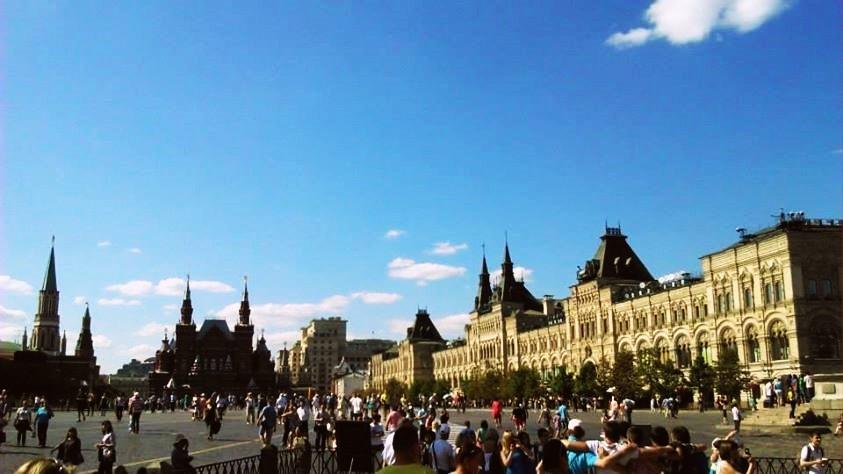 by Ciaran Cresswell
by Ciaran Cresswell
After the first few days in Moscow, it became clear it was not the most cosmopolitan of cities. Whereas in Paris or Rome you can usually hear English speakers everywhere, they were very scarce in Moscow. So unless you’re staying with a native, you might find it quite impregnable. Nevertheless, Moscow is a very interesting city.
Reminders of its communist past and capitalist present are everywhere: the beautiful Moscow metro resplendent in marble and chandeliers is adorned with many soviet murals; statues of Lenin abound; and you will nearly always be able to see one of the seven ‘Stalin skyscrapers’, which somehow manage to be simultaneously impressive and oppressive. In stark contrast, shopping centres and teeming high streets are everywhere, as well as plenty of fast food and café chains.
A visit to Red Square and the Kremlin will offer a glimpse of old Russia. The iconic St Basil’s Cathedral and the many churches inside the kremlin walls are truly unique, unlike anything anywhere else in Europe, making this area of the city feel unmistakeably Russian.
St. Petersburg, by contrast, has much more of an Imperial-era feel, as well as being very European and tourist-friendly. As a result, it came across as a friendlier and much more laid-back place than Moscow; never before have I shared a mutual nod with a stranger wearing a large paper Burger King crown.
Many of the buildings sport classical style columns and pediments, as is the norm in Europe, as well as many large domes in the style of St Paul’s Cathedral in London or St Peter’s Basilica in Rome. These differ from the onion domes of St Basil’s and the Church of the Saviour on Spilled Blood – built on the spot where a Tsar was assassinated – which is essentially a copy of St Basil’s built 300 years later in St Petersburg. As if this weren’t enough, the lavish Winter Palace (now the Hermitage Museum) looks like something right out of Paris or Vienna, and as a museum is certainly close to the Louvre in terms of scale. Also, walking round the grounds of Peterhof feels exactly like strolling around Versailles, only with more fountains – seriously, they’re everywhere. If there’s one thing I’ll say about the Russians, it’s that they know how to make a good fountain.
Russia is well worth visiting; it certainly has a lot more to offer that its politics, yet it seems this aspect is the only one that sees the light of day, leaving its people and its culture very much underrepresented. It struck me one sunny day strolling through Gorky Park in Moscow, that despite all the depressing news we hear and the complex political situation, everyone around me was happy, and, well, normal. It really seems as though we in the west have more in common with the Russian people than we might think, for walking through that park, I could have been anywhere in Europe.
EASY TO REMEMBER RUSSIAN WORDS AND PHRASES
ENGLISH WORDS RUSSIAN TRANSLATION HOW TO PRONOUNCE HOW TO REMEMBER I love you я люблю Вас ya lyublyu vas yellow blue bus shop магазин magazin magazine good хорошо horosho horror show dumpling* пельмень* pelmen’ pale man I’ll find vodka
водки найду vodki naidu what can I do dress up quicker одевайся скорее odevaisya skoreye our device is Korea
*Pelmen (Russian dumpling) – is one of the most famous traditional Russian dishes, similar to tortellini.
16 THEUOBLINGUIST.CO.UK
ITALIANO
KANYE WEST, OPPORE, IL MESSIA INCOMPRESO di Ludo Cinelli
I geni del rap moderno sono spesso male intesi, e lo è più spesso di tutti Kanye West. Per esempio, mentre le sue famose dichiarazioni durante il discorso di Taylor Swift ai Video Music Awards nel lontano 2009 sono state percepite come invadenti e fuori posto (Kanye suggerì che la sua amica Beyoncé avrebbe dovuto vincere il premio per ‘Miglior Video’) è chiaro che Kanye non intendesse che Swift non meritasse il premio, bensì che il giudice del premio avrebbe dovuto essere lui. Purtroppo, di queste due ipotesi completamente diverse, è stata ricordata solo la prima, e quindi quella incorretta.
E come è stato mal interpretato il suo comportamento quella sera, lo è sicuramente anche stato lo scorso 12 settembre a Sydney. Durante la sua performance, Kanye, infatti, ha chiesto (con obbligo) a tutto il pubblico di alzarsi in piedi a meno che ‘you got a handicap and special parking and shit’ (hai un handicap e il parcheggio riservato e merda). Fra le richieste della star, anche (senza obbligo) di mettersi in ginocchio con la testa chinata in silenzio, oppure ancora (sempre senza obbligo) di lanciare offerte di viveri ed oro oppure sacrifici (anche umani) verso il palco.
Le difficoltà del 12 settembre nascono non a causa delle richieste del rapper, bensì dalla presenza di due fan diversamente abili, che grazie alla maniera in cui la notizia è stata presentata dai media di tutto il mondo si conosceranno solo dai nomi ‘Protesi’ e ‘Sedia a Rotelle’. Protesi si staccò la gamba e la scosse per far vedere che non poteva alzarsi, ma potrebbe anche essere stata una offerta al dio del rap. Sedia a Rotelle, invece, non potendo alzarsi dalla sedia, rimase seduto. Kanye interruppe il brano e mandò due staff di sicurezza a verificare che Sedia a Rotelle fosse infatti in sedia a rotelle.
I media del mondo hanno commentato sulla questione etica di verificare se un ragazzo è veramente disabile quanto sembri. Ma quello che non sanno è il contenuto delle tasche dei due buttafuori. Nel caso di occorrenze del genere, infatti, Kanye piange prima di ogni spettacolo e riempie delle piccole fiale con le sue lacrime. Si dice che quest’ultime abbiano incredibili effetti medici (non provati scientificamente, ma da molte testimonianze da parte di Kanye stesso) inclusi il sollievo da pruriti dorsali e l’eliminazione della fame mondiale. Al momento della performance, quindi, il buttafuori responsabile di Protesi, lanciò la boccetta verso di lei, centrando sul setto nasale la ragazza, che cadde a terra sanguinante e piangendo (di gioia). L’altro, invece, andando vicino Sedia a Rotelle, afferrò il naso del ragazzo per fargli aprire la bocca, e gli introdusse il siero direttamente in gola. I ragazzi tuttora non hanno commentato sul funzionamento o meno delle lacrime, ma Kanye stesso dice che possono metterci da un giorno fino a cento anni per avere effetto.
È CHIARO CHE KANYE
NON INTENDESSE CHE
SWIFT NON MERITASSE IL PREMIO, BENSÌ CHE IL GIUDICE
DEL PREMIO AVREBBE DOVUTO



Mentre fan vicini al palco dicono di aver sentito Kanye sussurrare insulti e bestemmie durante la verifica del buttafuori. Invece, come ha spiegato il rapper durante un’intervista dopo lo spettacolo, stava infatti recitando una variazione di sua composizione di ‘Padre nostro’, dove ogni parola è sostituita o con ‘Kanye’ o con una parolaccia. E non solo: quella non era una preghiera, ma un simpatico e criptico annuncio del suo nuovo album ‘Pray 4 Kanye’ (Pregate x Kanye) pieno di fantastici single come ‘Hail Kanye’ (Ave Kanyia) e ‘The Gospel According to West’ (Il Vangelo secondo West). Quest’ultimo, con un tempo di riproduzione di ottanta ore, è un attesissima riduzione del nuovo testamento dal punto di vista del protagonista: in molte bibbie sarebbe Cristo, ma qui le figure del carpentiere di Nazareth e il rapper di Atlanta si sovrappongono molto.
Inoltre, quello che non raccontano i media è ciò che fece Kanye dopo lo spettacolo di venerdì. Come scusa per il malinteso, e conferma che non sia stato colpa sua, promise di regalare a Protesi e Sedia a Rotelle una copia del nuovo disco (da condividere) toccata da lui stesso. Questi fatti provano la prontezza dei media di oggi a cercare scandali con cui nascondere la verità, una malattia che non potrà neanche essere curate con una fiala di lacrime di Kanye.
GUILD OF STUDENTS ‘OUTSTANDING SOCIETY 2013’! 17
EAT AND DRINK LIKE AN ITALIAN IN BRUM by
Josephine Henry
For many of us, we either have to wait until our year abroad or long summer break to fully embrace another country’s culture and marvel at the culinary excellence of our European counterparts. However, while Birmingham may not have the picturesque landscape and ‘dolce vita’ that Italy boasts, it is very possible to at least dine like a true Italian.
FUMO
Located in the City Centre near the Cathedral, Fumo is a sophisticated, trendy Italian ‘tapas’ restaurant which offers high quality food and service without forcing you too far into your Student overdraft. If not for eating, the bar is perfect for an evening drink and with the staff speaking in Italian, it is easy to forget you are in Birmingham City Centre.
Cucina Rustica







When even the Italians themselves recommend Cucina Rustica, you know it must be ottimo! This little gem of a restaurant can be found in the Jewellery Quarter. It is also worth remembering that Cucina Rustica is not the only restaurant flying the flag for Italy in the Jewellery Quarter as a stone’s throw away is ‘Pasta di Piazza’, offering the same high quality food and service.
Piccolino
This trendy, sophisticated restaurant can be found in Brindley Place just a step away from Broadstreet, with Cielo and Carluccio’s within walking distance. Whether it be for a light lunch or an evening meal, Piccolino is perfect for those who don’t mind spending a bit more money in order to enjoy a fine dining experience. These restaurants are in the perfect setting to enjoy a glass of vino and food ‘da morire’ whilst looking out over the canals. Birmingham does have more canals that Venice after all!
These are just a small handful of the numerous Italian restaurants across the city waiting to be discovered. Buon appetito!
A SUMMER WITH ACLE
by Emily Martin
I love Italy. Who doesn’t? So when I was given the opportunity to go to Italy and teach in English Summer Camps I jumped at the chance. Let’s be honest, I wasn’t really going for the teaching. It was the thought of brushing up on my Italian, earning a bit of extra cash and, well, just being in Italy. Naturally though, what with Italy being Italy, I got a whole lot more.
My first camp was twenty miles outside of Rome, in a beautiful town on the side of a hill with an amphitheatre and monastery at its point. The school I was based in was grand, old and just over the road from the Pope’s summer residence! I suggested a school trip there but unfortunately the idea of letting seventy children run round His Holiness’ holiday home wasn’t greeted with much enthusiasm.
The family who were kind enough to look after me for the two weeks I was staying became my Italian family. They were so wonderful that I’m going back to see them next year! My class at the summer camp were adorable, a group of ten year olds who swiftly became my shadows; I felt like a mother duck with her trail of little ducklings. The teaching side of all of this was so fun I have been forced to eat my words. Jumping up and down wildly during morning circle yelling “go, go, go bananas” I realised I had absolutely no inhibitions left!
Well, I did go to Italy, and I did do a bit of brushing up on the old Italian, and I did make some money, but (and here comes the deep bit), I also made amazing friends, I have beautiful memories and I can’t wait to go back, yes even for the teaching!
18 THEUOBLINGUIST.CO.UK
THE IDEA OF LETTING SEVENTY CHILDREN RUN ROUND HIS HOLINESS’ HOLIDAY HOME WASN’T GREETED WITH MUCH ENTHUSIASM
POLSKI



















RZ D OPŁACI NAJLEPSZYM STUDIA ZA GRANIC POD
JEDNYM WARUNKIEM Agnieszka Rzesniowiecka
W exposé wygłoszonym pierwszego października, premier RP Ewa Kopacz zapowiedziała, że już od 2016 r. nawet kilkuset studentów najbardziej prestiżowych uczelni na świecie będzie finansowane przez państwo. W zamian jednak absolwenci będą zobowiązani do przepracowania w Polsce pięciu lat lub (jeśli podejmą decyzję o pracy poza krajem) spłacenia kredytu, którego im udzielono.
Taka inwestycja w studentów ma pomóc w umiędzynarodowieniu szkolnictwa oraz sektora naukowego w Polsce. Według bieżących danych, system finansowania uczniów ma odbywać się poprzez specjalnie do tego celu stworzoną linię kredytową. Na razie nie wiadomo, czy finansowanie będzie obejmować tylko koszty życia w innym kraju, czy także (często dotkliwie wysokie) czesne. Trwają również dyskusje na temat tego, czy najzdolniejsi będą mogli ubiegać się o dofinansowanie na każdym roku studiów, czy jedynie podczas dwóch ostatnich lat.
CREDIT: REUTERS/KACPER PEMPEL
Jedyną gminą w Polsce, która do tej pory zdecydowała się na pokrywanie (częściowe lub całkowite) kosztów studiów polskich uczniów za granicą jest Gdańsk wraz ze Stypendium Prezydenta Miasta Gdańska im. G.D. Fahrenheita. Stypendium wymaga od studentów wysokich ocen, osiągnięć akademickich oraz pozaakademickich, uczestnictwa w wolontariacie oraz prowadzenia prelekcji skierowanych do młodzieży z gimnazjów oraz liceów.
Oto opinie niektórych stypendystów Fahrenheita na temat planu finansowania studentów:
Uważam, że pomysł premier Ewy Kopacz może przynieść znakomite efekty. Znam wiele zdolnych osób, które mogłyby i chciałyby zrealizować swoje talenty za granicą, ale z powodu braku środków finansowych nie mogą tego zrobić. Jeżeli udałoby się wprowadzić ten pomysł w życie, Polska zyskałaby wiele na arenie międzynarodowej.
(Daniel Krajnik, student architektury na Cardiff University)
Sam pomysł finansowania studiów za granicą jest jak najbardziej potrzebny, sami [stypendyści] o tym wiemy, ale już przymus powrotu do kraju i przepracowania w nim 5 lat wydaje się odcinać studenta od możliwości rozwoju w wybranym kierunku, który w Polsce nie zawsze jest na tym samym poziomie – a pierwsze lata po studiach to przecież decydujący czas dla kariery. Może lepiej byłoby pomyśleć o bardziej efektywnym sposobie "odwdzięczenia" się państwu, w postaci inicjatyw społecznych czy projektów prowadzonych przez stypendystów.
(Aleksandra Kozawska, studentka języka włoskiego i wzornictwa na University College London)
Bardzo podoba mi się ten pomysł, ale warunek przepracowania 5 lat po studiach w Polsce może okazać się trudny do spełnienia na przykład dla naukowców, jeżeli będą specjalizować się w badaniach, których nie można przeprowadzić w Polsce z powodu braku specjalistycznych laboratoriów lub sprzętu. Myślę, że może być im ciężko znaleźć pracę, która w pełni wykorzystywałaby ich umiejętności.
(Katarzyna Lewandowska, studentka architektury na Cardiff University)
Myślę, że to brzmi świetnie. Interesuje mnie jednak to, czy premier Kopacz zaoferuje miejsca pracy dla absolwentów. Ja na przykład bardzo tęsknię i chcę wracać, ale nie mam żadnych widoków na pracę w moim zawodzie. Dlatego wydaje mi się, że opcja spłaty kredytu jest bardziej prawdopodobna, jeśli nie będzie wysoko oprocentowany. Tak czy inaczej, pomysł brzmi zachęcająco.
(Kalina Konieczny, studentka projektowania kostiumu scenicznego z elementami scenografii na The Arts University College w Bournemouth)
Czy taka forma kredytu dla studentów zadziała? Jeśli weźmiemy przykład ze względnie niedawnej przeszłości, można spodziewać się pozytywnych zmian. Podobny program został zaimplementowany w 20-leciu międzywojennym. Najlepsi studenci i młodzi naukowcy byli wysyłani na najlepsze uczelnie światowe. Kiedy wracali, stanowili elitę polskiej nauki, powiedział Piotr Müller, przewodniczący Parlamentu Studentów RP.
Niniejszym oświadczam, że jestem laureatką Stypendium Prezydenta Miasta Gdańska im. G.D. Fahrenheita.
GUILD OF STUDENTS ‘OUTSTANDING SOCIETY 2013’! 19
ελληνικά
Το να γίνω χορτοφάγος, είναι από τις περιπτώσεις στη ζωή μου που μπορώ να πω πως «δεν φταίω εγώ, απλά έτυχε». Δεν άρχισε λόγω της υπερβολικής αγαπής που έχω προς τα ζώα, απλώς προέκυψε λόγω ενός άτυχου περιστατικού, μιας ηλίθιας φωτογραφίας που κάποιος πόσταρε στο facebook και έδειχνε τα ζωάκια, λίγο πριν το τέλος τους Δεν μπορώ καν να περιγράψω πως ένιωσα όταν είδα τη φωτογραφία και πως νιώθω κάθε φόρα που το σκέφτομαι. Δεν μπορώ πλέον να σκεφτώ ή να βάλω στο πιάτο μου κάτι που κάποτε είχε ψυχή και έτσι απλά κάποιος του παίρνει τη ζωή απλά και μόνο επειδή θέλει να ικανοποιήσει την όρεξη του και να γεμίσει το στομάχι του. Απο τότε λοιπόν, ξεκίνησε και η δική μου χορτοφαγία. Πάντα ήμουν απαιτητική με το φαγητό και η αλήθεια είναι πως πάντα θέλω να έχω στο πιάτο μου κάτι υπέροχο και γευσάτο. Μου άρεσε πολύ το κρέας και στην οικογένεια μου και γενικά στην Κύπρο όλοι το ‘αγαπούν’ και το προτιμούν πάντα. Δυστυχώς, ο Κύπριος έχει στο τραπέζι του κρέας εφτά μέρες την εβδομάδα. Αν φάει όσπρια, πάλι θα έχει για ‘συνοδευτικό’ κάτι κρεατικό. Παλιότερα, όταν ζούσα με τους γονείς μου, έπρεπε να τρωω κρέας. Τα τελευταία τρία χρόνια όμως, ζω μόνη μου, μετακομίζω συνέχεια σε διάφορες
χώρες λόγω σπουδών, οπότε μαγειρεύω πλεον μόνο για τον εαυτό μου. Αυτό σημαίνει βασικά ένα πράγμα: ότι
κατάφερα να γίνω χορτοφάγος μόνο όταν έζησα μακριά απο την Κύπρο.
Αρκετοί με ρωτούν πως μπορώ να επιβιώνω χωρίς κρέας ή αν έχει γεύση το φαγητό μου. Η απάντηση μου είναι πάντα η ίδια: δεν έχει σημασία τι τρως, έχει σημασία ο τρόπος που μαγειρεύεις κάτι. Πάντως, δεν έχω παρατηρήσει επιπτώσεις στην υγεία μου. Αντιθέτως, οι αιματολογικές εξετάσεις μου είναι κάθε χρόνο και καλύτερες. Κάνοντας μια έρευνα στο διαδίκτυο ανακάλυψα ότι η χορτοφαγική διατροφή έχει υψηλή περιεκτικότητα σε φυτικές ίνες, φυλλικό οξύ, βιταμίνες C και Ε, κάλιο και μαγνήσιο.
Υπάρχουν διάφοροι τύποι χορτοφάγων, όπως για παράδειγμα:
οι λακτο-ωο-φάγοι (Lacto-ovo-vegetarian), που τρώνε αυγά και γαλακτοκομικά προϊόντα, αλλά όχι κρέας, πουλερικά ή θαλασσινά,
οι λακτο-χορτοφάγοι (lactovegetarian), που τρώνε γαλακτοκομικά προϊόντα αλλά όχι αυγά, κρέας, πουλερικά









ή θαλασσινά,
οι ωο-χορτοφάγοι (ovo-vegetarian), που καταναλώνουν αυγά, αλλά όχι γαλακτοκομικά προϊόντα, κρέας, πουλερικά ή θαλασσινά, και
οι αυστηροί χορτοφάγοι (vegan), που δεν τρώνε καθόλου ζωικά προϊόντα.
Εδώ και τρία χρόνια περίπου, η διατροφή μου είναι αυτό που θα έλεγε κανείς χορτοφαγική (ή σχεδόν χορτοφαγική, lactovegetarian για να γίνω πιο συγκεκριμένη). Αποτελείται από καφέ (κυρίως), όσπρια, ξηρούς καρπούς, λαχανικά, φρούτα, ζυμαρικά αλλά και διαφόρα γαλακτοκομικά προϊόντα. Το πιο σημαντικό είναι ότι δεν μου λείπει καθόλου το κρέας. Το μεσημέρι, ένα μικρό κατσαρολάκι, λίγο νερό, λίγο αλάτι κι έτοιμα το ρύζι ή τα μακαρόνια και τα όσπρια με σαλάτα. Όπως βλέπετε, είναι θέμα του τι εξυπηρετεί περισσότερο και ό,τι είναι πιο γρήγορο και βολικό. Γι’αυτό, αν εσείς οι φοιτητές θέλετε να κάνετε μια καλύτερη διατροφή, είναι πολύ εύκολο όταν ζείτε στο εξωτερικό και κυρίως όταν δεν έχετε και αρκετό ελεύθερο χρόνο για να μαγειρέψετε.
Τη διατροφική μου «περιπέτεια» τη θυμήθηκα σχετικά πρόσφατα, αρχές του μήνα, 1η Όκτωβρίου, την Παγκόσμια Ημέρα Χορτοφαγίας. Ψάχνοντας από περιέργεια, ανακάλυψα πως στην Κύπρο υπάρχουν διάφορα blogs και σελίδες στο facebook όπου μπορείτε να βρείτε απαντήσεις σε όποια απορία έχετε σχετικά με την χορτοφαγία. Αυτό που μένει μόνο είναι να ανοίξουν περισσότερα εστιατορία για χορτοφάγους στην Κύπρο ούτως ώστε να υπάρχουν περισσότερες επιλογές για όλους και για όλα τα γούστα.
ΟΡΤΟΦΑΓΊΑ:ΗΚΑΛΎΤΕΡΗΕΠΊΛΟΓΗΓΊΑ
20 THEUOBLINGUIST.CO.UK
ΤΟΎΣΦΟΊΤΗΤΕΣ αποτηSusanna Georgiou
CHINESE 汉语
ONLINE IDIOMS by Stephanie Chung 鍾斯婷
Visit any Chinese website and you are likely to find what are known as 'online idioms' (网络成语). Just the same as most traditional spoken Chinese idioms, these new phrases also consist of four characters. But unlike the traditional ones, online idioms do not use analogy or metaphor - they are a form of abbreviation, and generally shorten a long sentence into just four words.
1) 不明觉厉
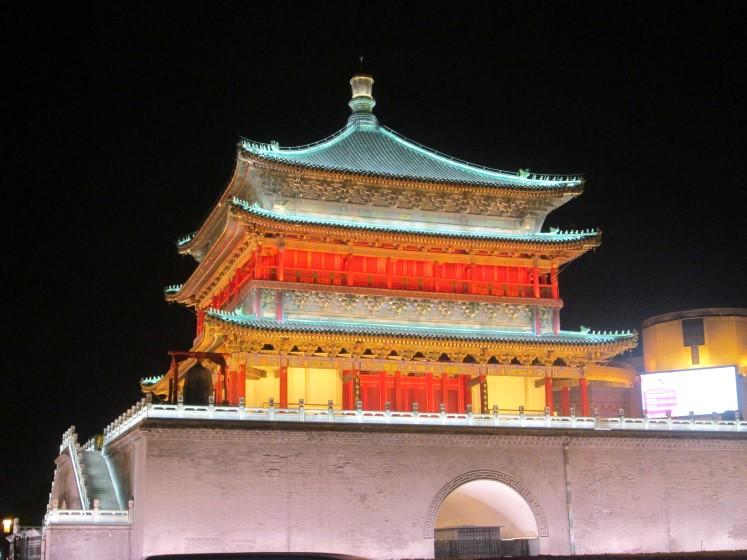
One frequently used phrase is ‘不明觉厉’ To break this down, the first character means 'not' and the second one is the verb 'to understand'. These are followed by another verb 'to feel' and lastly an expression of 'great' or 'amazing' (厉害). This phrase describes a sense of admiration towards professionals or experts because the whole idiom simply means, “I can’t understand anything you're saying, but it sounds great!” Some people also use this as sarcasm towards professional jargon used in unnecessary situations.
2) 细思恐极
Have you ever experienced an incident which didn’t seem abnormal at the time, but was actually quite creepy when you recalled the whole event afterwards? 细思恐极 is another ‘online idiom’ using abbreviation. The first character means ‘carefully’ or ‘thoroughly’ in this context. The other three words have more or less the same meanings as in the dictionary, which are ‘think’, ‘scary’ and ‘extremely’ respectively.
3) 火钳刘明
This is perhaps the most interesting one because it is commonly used in social media comments. Apart from the very first character, which is the adjective ‘hot’ or ‘popular’, the following three characters are homonyms. The second word sounds the same as the Chinese word ‘before’. The last two characters are the homonyms for ‘leaving names’, which is to sign. When you see a Facebook post or an Instagram photo that you think it will be a popularly discussed one in the foreseeable future, you will leave the comment ‘火钳刘明’ to show that you have already paid attention to it way before the topic becomes a hot issue.
















These are just a few examples of the many newly-created online idioms. Although they are just for informal use, it becomes much easier to communicate in Chinese through the internet if you know how to use them. This would definitely help you enjoy yourself whilst learning this complex language, and most importantly, you will no longer find yourself thinking “不明觉厉’!
旅行 丁文
我很喜欢旅行!
我觉得旅行是了解一下其他的国家的风俗最好的方法。 我在中国的时候有机会去旅 行,看看中国不同的地方,我很高兴。 我去了许多的地方。 除了 北京以外,我也去了上海,西安,青岛什么的。 这些城市很有意 思,跟北京不一样。
在上海有很多外国人,
很多人说英语。
在西安有很多名胜古迹, 最有名的是兵马俑,非常重要。
青岛是中国的一个海滨城市,气候很舒服。我去的时候,天气很 好,我去了沙滩。
我将来希望能看中国的别的地方,不同的风俗。
旅行只有一个坏处 ----- 很贵!
GUILD OF STUDENTS ‘OUTSTANDING SOCIETY 2013’! 21
JAPANESE 日本語














日本のファッション事情を語る上で不可欠なのは、
トレンドの発信力・浸透力だ。 稲葉香那
季節毎に新しいトレンドをメディアが提案し、店頭にはその商品がずらりと並ぶ。ファッションフロ アを一周すれば類似した商品を度々目にすることになり、意図せずともト レンドを把握出来る。消費者はトレンド商品を手にすると、「フェミニ ン」「原宿系」など自分の系統に合わせてコーディネートを楽しむ。
私個人の見解だが、数年前までは雑誌などに掲載されるトレンド商品の コーディネートはワンパターンであった。それを模倣する人が多く、街中 は似た格好の人間で溢れていた。しかし前述の通り、昨今は自分の系統に 傾倒した自由なコーディネートを楽しむ人が増えている。これは新たなト レンドが次々と登場する過程で、ファッション業界が毎度新鮮な提案をす る必要に迫られていることに起因すると思われる。過去に「奇抜」と思われかねた格好も今やトレン ドに変貌を遂げ消費者に影響を与えている。前例のない コーディネートも肯定される時代が到来したのだ。
スカートやヒール靴を常用するなど日本人女性のファッ ションの幅は元来広い。現在それが更なる広がりを見 せ、「自分らしいファッションコーディネート」を模索 できる環境が確立された。このファッションに対する認 識の変化は個人としての主張を苦手とする日本人にとっ て、他人と違う自分を見つける大いなるチャンスになり 得ると考える。
街中は似た 格好の人間 で溢れてい
JAPANESE IDIOMS: 十人並み (じゅうにんなみ, juunin nami)
22 THEUOBLINGUIST.CO.UK
Quality or capability of a person that is not better than others, nor tremendously worse
Ordinariness as a consequence of being average and not exceptional, subsequently lacking special distinction, rank or status. Commonly encountered (e.g. average people)
CHAIR: Maddie Kilminster
OUR TEAM
THE LINGUIST TEAM 2014
PROOF READER & TRAVEL: Yashi

Banymadhub
























SECRETARY & CURRENT AFFAIRS: Susanne Hartmann



DEPUTY PROOF READER & CULTURE: Clare O’Driscoll

TREASURER: Joel Mitchell




SOCIAL SECRETARY: Kirsten Peters Roebuck








PUBLICITY & RUSSIAN: Natalia Alyukova
CREATIVE DESIGNER Adele May

GERMAN: Catherine Dawkins
DESIGN ASSISTANT & FOOD AND DRINK Dom Phipp
LIFE & STYLE Daisy Lindlar
CHINESE Nick Lanigan
FRENCH Pierre Greenhalgh
SPANISH Olivia Doyle
GREEK Susanna Georgiou

ITALIAN Ciaran Cresswell
French Section Header: Roberto Taddeo (https://www.flickr.com/photos/robertotaddeo/)
German Section Header: Harald Hoyer (https://www.flickr.com/photos/hhoyer)
JAPANESE Arisa Lee
POLISH Pawel Pokorski
PORTUGUESE Kia Hunt

Join us for only 5 per year! Find us on The Guild Of Students website www.guildofstudents.com) and then click Groups & volunteering > Student Groups Groups & societies > Media section
Sigurbjörnsson
Culture
-
-0830/festival-tourism-linking-cultures-2)
Credit for photographs: Current Affairs Section Header: Börkur
(http://www.borkur.net)
Header: UNWTO World Tourism Organization (http://wtd.unwto.org/photo
competitor/2011































































































































 by Lucie
by Lucie









 Norris
Norris


















 Daisy Lindlar
Daisy Lindlar







 by Sarah Dipchan
by Sarah Dipchan









 by Floren Villanueva Scrafton
by Floren Villanueva Scrafton
































































































 by Ciaran Cresswell
by Ciaran Cresswell

































































































